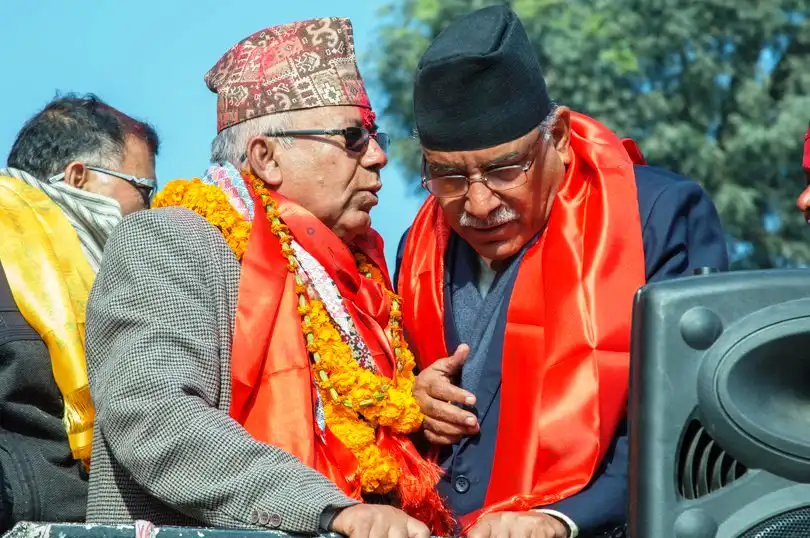

Two key communist leaders, Prachanda and Madhav Nepal hope to merge their parties after Nepal elections
Nepal’s two ruling communist parties the Communist Party of Nepal (Maoist Center) and Communist Party of Nepal (Unified Socialist) have decided to contest upcoming general elections with a common manifesto.
The CPN (MC) led by Pushpa Kamal Dahal alias Prachanda and CPN (US) led by Madhav Kumar Nepal are the two key constituents of the Deuba-led coalition government which came into existence in July 2021, succeeding the government headed by KP Sharma Oli.
The CPN (MC) and CPN (US) have a plan to merge and form a new communist party after general elections are held in November, leaders said.
“We will contest general elections with a common manifesto and our ultimate goal is to unify and launch a new party immediately after elections,” Narayan Kaji Shrestha, a senior vice president of the CPN (MC), told India Narrative.
The CPN (US) is a new political party formed after splitting from the Communist Party of Nepal (Unified Marxist Leninist) led by KP Sharma Oli.
Beduram Bhusal, general secretary of CPN (US), said that a coordination committee has been formed by their party to intensify talks with the CPN (Maoist Center) for the unification after elections.
“Our ultimate goal is to bring all the communist parties under an umbrella for the sake of the country’s political stability. If that can’t be achieved immediately, like-minded communist parties should contest elections with a common manifesto,” Bhusal told India Narrative on Wednesday.
Earlier on Monday, a meeting between the co-chairs of the CPN (Maoist Center) and CPN (Unified Socialist) decided to chalk out strategies for the elections with a common manifesto. The co-chairs also decided to unify and merge their two parties after elections.
Although the two ruling parties have planned to unify after elections, they will remain part of the ruling coalition led by Prime Minister Deuba.
According to observers, there are two reasons why the ruling Maoist Center is now talking about launching the common manifesto CPN (Unified Socialist) and go for the party unification after elections.
“The first is the Maoist Centre is now seeking to form a largest communist front minus the CPN-UML led by KP Sharma Oli. This will keep the main opposition CPN-UML in check. Second, it wants to block the Nepali Congress from winning close to majority seats,” Sitaram Baral, a political analyst based in Kathmandu, told India Narrative.
The CPN (Unified Socialist) also has reasons to contest elections under a common manifesto and ultimately go for the unification with the Maoist Center.
“The Unified Socialist, whose performance in last local level elections was poor, wants to secure good seats in federal and provincial elections. The party also wants to keep the CPN-UML in check in the coming days,” Baral observed.
Nepal is holding provincial level and federal level elections on November 20 in a single phase.
Earlier in the first week of August, the ruling coalition had decided to continue the alliance until elections.
As per the understanding reached among five coalition partners in the Nepali Congress-led ruling alliance, a taskforce is presently working to finalize the modality of the seat-sharing arrangements in the elections.
As 86 days are left for holding of the provincial and federal elections, political parties have started their election campaigns across the country.
According to the constitution, Nepal holds local, provincial and federal elections every five years. This is the second time the Himalayan country holds federal and provincial elections after it adopted its first democratic republic constitution in September 2015.
Also Read: Maoist chief Prachanda to visit India from Friday as crucial elections loom in Nepal
Also Read: Senior Chinese official arrives in Nepal to unify Communist factions ahead of elections
India's coal imports fell by 7.9 per cent, totalling 243.62 million tonnes (MT), compared to…
At least 88 illegal Bangladeshi migrants have been traced and detained by teams of South…
Japan has accused China of conducting maritime scientific research without prior notification within its exclusive…
Indian businesses are aiming exports to the tune of USD 1 trillion in the current…
Border Security Force (BSF's) Assistant Commandant Neha Bhandari commanded a forward post along the International…
The French Ambassador for the Ocean and French President's Special Envoy for the United Nations…